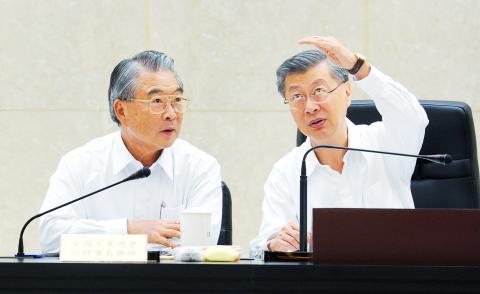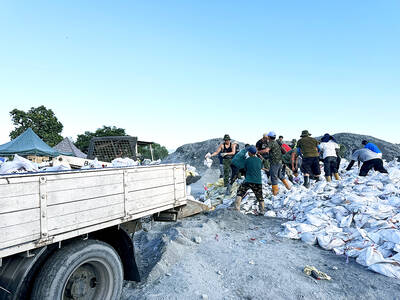Government officials and business leaders yesterday got together to brainstorm strategies on how the two sectors can operate together to boost the country’s economic interaction and connectivity with the global economy.
The Executive Yuan yesterday held the first of a series of five “solution-oriented” symposiums to discuss strategies for 52 issues with regard to the country’s international trade situation.
The three-and-a-half-hour closed-door meeting, presided over by Premier Sean Chen (陳冲), was attended by 26 Cabinet officials from various departments and agencies as well as 25 representatives from business associations and trade groups and enterprises.

Photo: Lo Pei-der, Taipei Times
In his opening remarks, Chen urged the nation and the people to have “fresh economic thinking” and to embrace policies that can make the country “more adaptive to international economic and trading systems.”
Drawing on a recent speech by North Korean leader Kim Jong-un that called for “fresh economic thinking,” Chen said “even North Korea now considers ‘fresh economic thinking’ a necessity. We need it badly.”
Discussions at yesterday’s meeting focused on three main themes encompassing the 52 issues — how to integrate the nation into regional economic blocs, how to enhance international industrial cooperation and attract foreign business investment to Taiwan, and how to boost national exports.
The meeting concluded with Chen agreeing to lead the Cabinet-level International Economic and Trade Strategic Alliance Arrangement Taskforce, a mechanism set up in 2004 and led by vice premier.
Chen said the change could lead to better coordination between government agencies as it requires “inter-agency efforts” to push through policies to cope with the problems adapting to trade liberalization.
A taskforce led by the premier would require Cabinet officials, rather than deputy Cabinet officials, to partake in its meetings Chen said following the meeting.
Minister of Economic Affairs Shih Yen-shiang (施顏祥) said the ministry would work out the details regarding the naming of the taskforce, its set-up and its missions within 10 days, in order to meet the expectations of business leaders who initially suggested that Chen form a new taskforce to lead the nation’s free-trade agreement (FTA) initiatives.
Chinese National Federation of Industries chairman Rock Hsu (許勝雄) and General Chamber of Commerce of the Republic of China chairman Lawrence Chang (張平沼), promised to allocate business resources to help the cause.
The business community is to form an “advisory group” to work together with public sector.
“We cannot afford to leave Taiwan marginalized by international economic integration,” Hsu said.
Among the business leaders attending the meeting there was no representation from the agricultural industry — a sector often vulnerable to the impact of trade liberalization.
During the discussion, business representatives raised concerns about whether the agricultural sector is willing to liberalize agricultural trade, Council of Agriculture Minister Chen Bao-ji (陳保基) said.
However, the two major problems facing the country’s agriculture are that it has to adjust the way agricultural resources are used and improve efficiency, he said.
“No matter if we move towards trade liberalization in agriculture or not, the two problems need to be resolved,” Chen said.
“For example, the government spends about NT$10 billion (US$333.56 million) annually in fallow subsidies which is neither productive nor does it generate employment. The resources used in the subsidy should be used to assist farmers with the development of agriculture-related industry,” he said.
The other four symposiums revolved around the issues of energy, the finance industry, industrial relations and manpower resources. The tourism and convention and exhibition industry were scheduled to be discussed on Aug. 18, 21, 25 and 28.

Taipei, New Taipei City, Keelung and Taoyuan would issue a decision at 8pm on whether to cancel work and school tomorrow due to forecasted heavy rain, Keelung Mayor Hsieh Kuo-liang (謝國樑) said today. Hsieh told reporters that absent some pressing reason, the four northern cities would announce the decision jointly at 8pm. Keelung is expected to receive between 300mm and 490mm of rain in the period from 2pm today through 2pm tomorrow, Central Weather Administration data showed. Keelung City Government regulations stipulate that school and work can be canceled if rain totals in mountainous or low-elevation areas are forecast to exceed 350mm in

EVA Airways president Sun Chia-ming (孫嘉明) and other senior executives yesterday bowed in apology over the death of a flight attendant, saying the company has begun improving its health-reporting, review and work coordination mechanisms. “We promise to handle this matter with the utmost responsibility to ensure safer and healthier working conditions for all EVA Air employees,” Sun said. The flight attendant, a woman surnamed Sun (孫), died on Friday last week of undisclosed causes shortly after returning from a work assignment in Milan, Italy, the airline said. Chinese-language media reported that the woman fell ill working on a Taipei-to-Milan flight on Sept. 22

The Central Emergency Operations Center (CEOC) has made a three-phased compulsory evacuation plan for Hualien County’s Mataian River (馬太鞍溪) disaster zone ahead of the potential formation of a typhoon. The plan includes mandatory vertical evacuation using air-raid-style alarms if needed, CEOC chief coordinator Chi Lien-cheng (季連成) told a news conference in the county yesterday. Volunteers would be prohibited from entering the disaster area starting tomorrow, the retired general said. The first phase would be relocating vulnerable residents, including elderly people, disabled people, pregnant women and dialysis patients, in shelters and hospitals, he said. The second phase would be mandatory evacuation of residents living in

COUNTERMEASURE: Taiwan was to implement controls for 47 tech products bound for South Africa after the latter downgraded and renamed Taipei’s ‘de facto’ offices The Ministry of Foreign Affairs is still reviewing a new agreement proposed by the South African government last month to regulate the status of reciprocal representative offices, Minister of Foreign Affairs Lin Chia-lung (林佳龍) said yesterday. Asked about the latest developments in a year-long controversy over Taiwan’s de facto representative office in South Africa, Lin during a legislative session said that the ministry was consulting with legal experts on the proposed new agreement. While the new proposal offers Taiwan greater flexibility, the ministry does not find it acceptable, Lin said without elaborating. The ministry is still open to resuming retaliatory measures against South